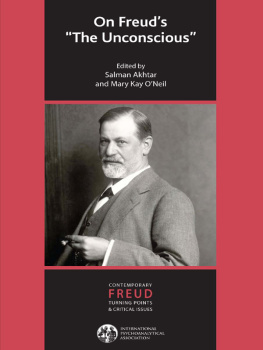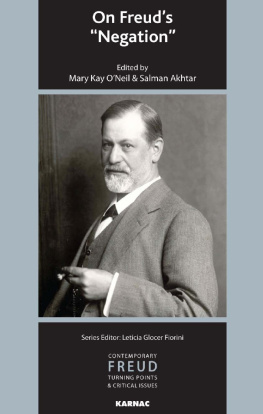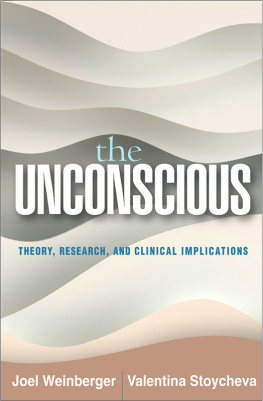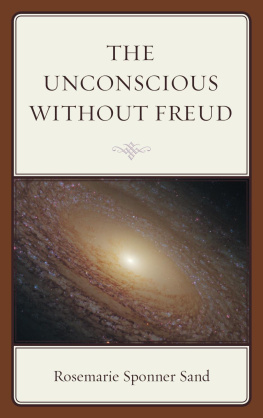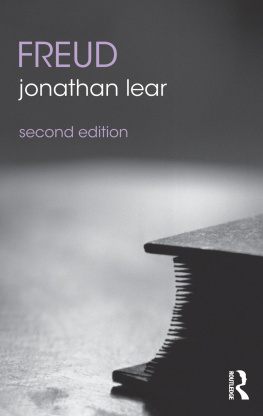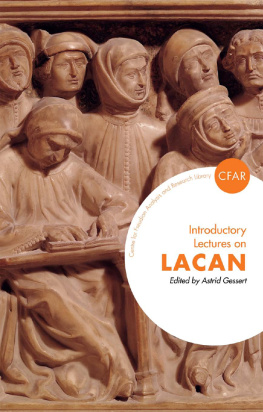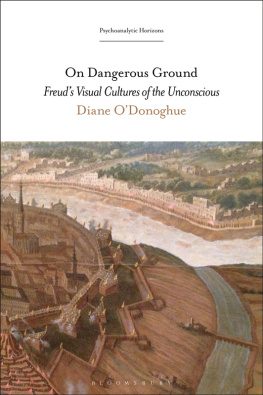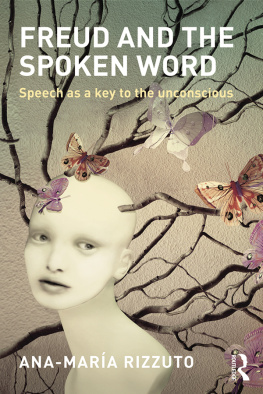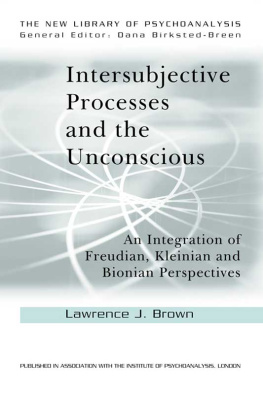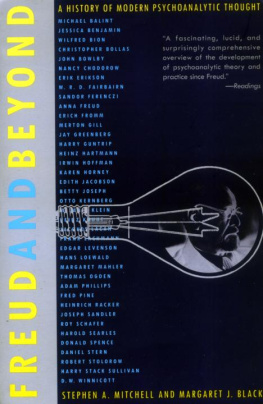CONTEMPORARY FREUD
Turning Points and Critical Issues
Series Editor: Gennaro Saragnano
IPA Publications Committee
Gennaro Saragnano (Rome), Chair; Leticia Glocer Fiorini (Buenos Aires), Consultant;
Samuel Arbiser (Buenos Aires); Paulo Cesar Sandler (So Paulo); Christian Seulin (Lyon);
Mary Kay O'Neil (Montreal); Gail S Reed (New York); Catalina Bronstein (London);
Rhoda Bawdekar (London), ex-officio as Publications Officer;
Paul Crake (London), IPA Executive Director (ex officio)
On Freud's Analysis Terminable and Interminable
edited by Joseph Sandler
On Freud's On Narcissism: An Introduction
edited by Joseph Sandler, Ethel Spector Person, Peter Fonagy
On Freud's Observations on Transference-Love
edited by Ethel Spector Person, Aiban Hagelin, Peter Fonagy
On Freud's Creative Writers and Day-Dreaming
edited by Ethel Spector Person, Peter Fonagy, Srvulo Augusto Figueira
On Freud's A Child Is Being Beaten
edited by Ethel Spector Person
On Freud's Group Psychology and the Analysis of the Ego
edited by Ethel Spector Person
On Freud's Mourning and Melancholia
edited by Leticia Glocer Fiorini, Thierry Bokanowski, Sergio Lewkowicz
On Freud's The Future of an Illusion
edited by Mary Kay O'Neil and Salman Akhtar
On Freud's Splitting of the Ego in the Process of Defence
edited by Thierry Bokanowski and Sergio Lewkowicz
On Freud's Femininity
edited by Leticia Glocer Fiorini and Graciela Abelin-Sas
On Freud's Constructions in Analysis
edited by Thierry Bokanowski and Sergio Lewkowicz
On Freud's Beyond the Pleasure Principle
edited by Salman Akhtar and Mary Kay O'Neil
On Freud's Negation
edited by Mary Kay O'Neil and Salman Akhtar
On Freud's On Beginning the Treatment
edited by Christian Seulin and Gennaro Saragnano
On Freud's Inhibitions, Symptoms and Anxiety
edited by Samuel Arbiser and Jorge Schneider
ON FREUD'S
THE UNCONSCIOUS
Edited by
Salman Akhtar & Mary Kay O'Neil
Series Editor
Gennaro Saragnano
CONTEMPORARY FREUD
Turning Points and Critical Issues
KARNAC
First published in 2013 by
Karnac Books Ltd
118 Finchley Road
London NW3 5HT
Copyright 2013 to Salman Akhtar and Mary Kay O'Neil for the edited collection, and to the individual authors for their contributions.
The rights of the contributors to be identified as the authors of this work have been asserted in accordance with 77 and 78 of the Copyright Design and Patents Act 1988.
All rights reserved. No part of this publication may be reproduced, stored in a retrieval system, or transmitted, in any form or by any means, electronic, mechanical, photocopying, recording, or otherwise,without the prior written permission of the publisher.
British Library Cataloguing in Publication Data
A C.I.P. for this book is available from the British Library
ISBN 9781782200277
Edited, designed and produced by The Studio Publishing Services Ltd
www.publishingservicesuk.co.uk
e-mail:
Printed in Great Britain
www.karnacbooks.com
CONTEMPORARY FREUD
IPA Publications Committee
This significant series was founded by Robert Wallerstein and subsequently edited by Joseph Sandler, Ethel Spector Person, Peter Fonagy, and, lately, by Leticia Glocer Fiorini. Its important contributions have always greatly interested psychoanalysts of different latitudes. It is therefore my great honour, as the new Chair of the Publications Committee of the International Psychoanalytical Association, to continue the tradition of this most successful series.
The objective of this series is to approach Freud's work from a present and contemporary point of view. On the one hand, this means highlighting the fundamental contributions of his work that constitute the axes of psychoanalytic theory and practice. On the other, it implies the possibility of getting to know and spreading the ideas of present psychoanalysts about Freud's oeuvre, both where they coincide and where they differ.
This series considers at least two lines of development: a contemporary reading of Freud that reclaims his contributions, and a clarification of the logical and epistemic perspectives from which he is read today.
Freud's theory has branched out, and this has led to a theoretical, technical, and clinical pluralism that has to be worked through. It has, therefore, become necessary to avoid a snug and uncritical coexistence of concepts in order to consider systems of increasing complexities that take into account both the convergences and the divergences of the categories at play.
Consequently, this project has involved an additional taskthat is, gathering psychoanalysts from different geographical regions representing, in addition, different theoretical stances, in order to be able to show their polyphony. This also means an extra effort for the reader that has to do with distinguishing and discriminating, establishing relations or contradictions that each reader eventually will have to work through.
Being able to listen to other theoretical viewpoints is also a way of exercising our listening capacities in the clinical field. This means that the listening should support a space of freedom that would allow us to hear what is new and original.
In this spirit, we have brought together authors deeply rooted in the Freudian tradition and others who have developed theories that had not been explicitly taken into account in Freud's work.
The unconscious is one of the most important and well known of Freud's essays on metapsychology. Written in 1915, it contains and describes the basic concepts of what is known as the Freudian topographic model of the mind. Salman Akhtar and Mary Kay O'Neil have now collected here a series of essays written by very distinguished analysts who approach and comment on this text of Freud's in the light of contemporary psychoanalysis and from different points of view, including recent studies in neurophysiology and ethology. This renders the readers updated on one of the core concepts of our discipline. Special thanks are, therefore, due to the editors and to the contributors to this volume, which enriches the Contemporary Freud series.
Gennaro Saragnano
Series Editor
Chair, IPA Publications Committee
ACKNOWLEDGEMENTS
We are deeply grateful to the distinguished colleagues who contributed to this volume. We appreciate their efforts, their sacrifice of time, and their patience with our requirements, reminders, and requests for revisions. We are also grateful to Dr Joseph Slap for his help with one of the chapters in this book. We acknowledge with sincerity the guidance of the members of the IPA Publications Committee, especially its Chair, Genaro Saragnano. We are also thankful to Jan Wright for her skillful help in preparing parts of the manuscript, to Frederick Lowy for his insightful comments and translation of parts of the German text, and to Rhoda Bawdekar for keeping track of all sorts of matters during the book's production. Finally, we wish to express our gratitude to Oliver Rathbone of Karnac Books who shepherded this project to its completion and to the team at The Studio Publishing Services for their meticulous copy-editing and typesetting.
Salman Akhtar & Mary Kay O'Neil
EDITORS AND CONTRIBUTORS
Marilia Aisenstein is a training analyst of the Hellenic Psychoanalytical Society and the Paris Psychoanalytical Society. She has been president of the Paris Society and of the Paris Psychosomatic Institute, a member of the editorial board of the

